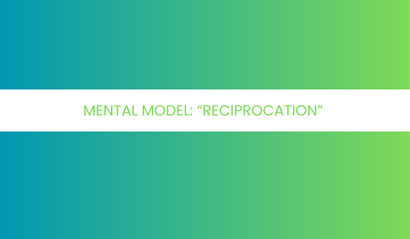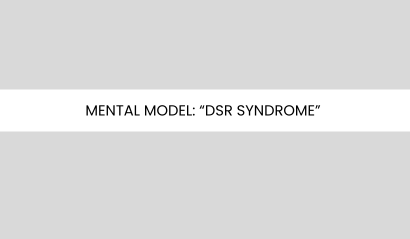Mental Model: Reciprocation
Reciprocation is one of the most powerful social forces that shape human behavior. It is a fundamental principle that influences how we interact with others, make decisions, and even fall prey to persuasion tactics. Understanding the psychology behind reciprocation can help us navigate our personal and professional relationships more effectively. In this blog, we will explore the origins of reciprocation, how it works, provide real-world examples, and discuss strategies to avoid being manipulated by it.
The Origins of Reciprocation
The principle of reciprocation has deep evolutionary and cultural roots. From an evolutionary standpoint, reciprocation helped humans survive by fostering cooperation and social bonds. Early human societies relied on mutual exchange—whether it was sharing food, providing protection, or collaborating in hunting and gathering. The expectation that kindness or assistance should be returned ensured that individuals contributed to the well-being of the group.
In a cultural context, reciprocation is a universal social norm. Across all societies, people are taught to return favors, whether in the form of gifts, assistance, or hospitality. Many religions and philosophies emphasize the importance of reciprocity. For example, the concept of “karma” in Hinduism and Buddhism, or the biblical teaching “do unto others as you would have them do unto you,” both reinforce the idea that one’s actions will eventually be reciprocated.
The Psychology Behind Reciprocation
Reciprocation operates as an automatic response mechanism, meaning that when someone does something for us, we feel an obligation to return the favor. This psychological principle is so ingrained in human behavior that we often reciprocate without even thinking about it.
The principle of reciprocation was extensively studied by social psychologist Robert Cialdini in his book Influence: The Psychology of Persuasion. He identified reciprocation as one of the six universal principles of persuasion, explaining that it works because people generally dislike feeling indebted to others. This discomfort often leads them to fulfill the obligation, even when they do not want to.
Reciprocation can take many forms, including:
- Material Reciprocation: Returning gifts or favors.
- Emotional Reciprocation: Expressing gratitude or affection in response to kindness.
- Social Reciprocation: Offering help when someone has previously assisted you.
While reciprocation is beneficial in maintaining social harmony, it can also be exploited in various ways.
Real-World Examples of Reciprocation
1. Marketing and Sales Tactics
Businesses frequently use reciprocation as a tool to influence consumer behavior. A classic example is the free sample strategy. When a company offers a free product sample, people often feel compelled to purchase the product because they subconsciously want to reciprocate the favor.
Another example is when salespeople or fundraisers provide a small gift—such as a pen, a calendar, or even a free consultation—before making a request. Research has shown that people are more likely to comply with requests after receiving such gifts.
2. The ‘Door-in-the-Face’ Technique
This technique, often used in negotiations or sales, involves making a large request that is expected to be refused, followed by a smaller, more reasonable request. The idea is that when someone declines the first request, they feel obligated to comply with the second one, seeing it as a form of compromise. For example, if a charity asks for a $500 donation and is turned down, they may follow up with a request for a smaller $50 donation, which seems much more reasonable by comparison.
3. Reciprocity in Social Relationships
In friendships and romantic relationships, reciprocation plays a crucial role in maintaining balance. If one person constantly gives without receiving anything in return, the relationship may become strained. Conversely, when someone offers kindness or assistance, the recipient often feels obligated to return the favor, strengthening the bond between them.
4. Workplace Dynamics
Reciprocation also affects professional settings. Employees who receive mentorship, support, or recognition often feel compelled to reciprocate by being more loyal or productive. Similarly, managers who show appreciation and fairness tend to receive higher levels of commitment from their teams.
5. Politics and Diplomacy
Politicians and diplomats frequently use reciprocation to gain favor. For instance, a politician might provide assistance or funding to a particular group, expecting votes in return. In international relations, countries offer aid or military support with the expectation of future cooperation.
How to Avoid Falling Victim to Manipulative Reciprocation
While reciprocation is a natural and beneficial social mechanism, it can also be exploited for manipulation. Here are some strategies to avoid being unduly influenced:
1. Recognize the Tactic
The first step in avoiding manipulation is awareness. If you can recognize when someone is using the principle of reciprocation to influence you—such as a salesperson offering a free gift or a negotiator employing the “door-in-the-face” technique—you can take a step back and assess whether your response is genuine or pressured.
2. Pause Before Responding
When you feel the urge to reciprocate, pause and reflect. Ask yourself:
- Do I genuinely want to return the favor, or am I feeling pressured?
- Is this exchange fair, or is it designed to manipulate me?
- Would I have done this if I had not received something first?
3. Accept Without Obligation
If someone gives you something unexpectedly, remind yourself that accepting a gift does not mean you owe them anything. A simple “thank you” is often enough. Avoid feeling pressured into an obligation you did not agree to.
4. Set Boundaries
In both personal and professional relationships, it is important to establish boundaries regarding reciprocation. If you are constantly expected to return favors or if someone takes advantage of your kindness, be upfront about what you are comfortable with.
5. Decline When Necessary
You do not always have to accept favors, gifts, or offers—especially if you suspect that they come with strings attached. If an offer feels manipulative, it is okay to politely decline.
Conclusion
Reciprocation is a fundamental aspect of human interaction that promotes cooperation, trust, and social harmony. However, it can also be used as a powerful tool of influence and manipulation. By understanding the psychological principles behind reciprocation and learning how to recognize when it is being exploited, we can make more conscious decisions and avoid being unduly pressured into actions we do not genuinely want to take. Whether in marketing, social relationships, or workplace dynamics, being mindful of how reciprocation works allows us to navigate interactions with greater awareness and control.







